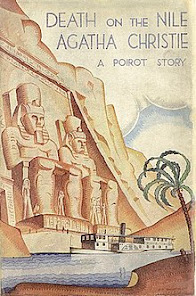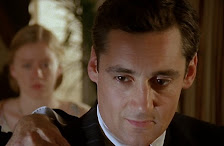
To relax, I write personal
Star Trek fan fiction. I use my own invented characters set within
Star Trek: TNG,
Star Trek: Voyager, and
Star Trek: TOS episodes.
The result is a great deal of insight on what works, what doesn't work, and why some episodes (even though I like them) may not be as well-written as others (and vice versa).
It is also provides insight about the differences (negatives and positives) of
closed versus open environments.
Star Trek: TNG is an open environment. Enterprise operates within a vast area, the entire Alpha Quadrant, which is chock-full of outside influences: crew members transfer on and off the ship; family members come to visit; the ongoing political and social problems of various systems--the Klingon Empire, for instance--crop up over and over.
Star Trek: Voyager is a closed environment. Although Voyager encounters a few ongoing rivals, and the Borg is a constant problem, Voyager itself remains a fairly small population (150 is stated in a few episodes although naturally that number fluctuates slightly what with births and deaths) with only occasional additions (such as Seven).
Open environment positives:
It is easy to create problems in an open environment. The Enterprise is called in to arbitrate. Or it rescues some druggies and their dealers. Or it is required to transport some dignitary some place or other.

From a writing perspective, open environments present a continual stream of opportunities. If it is a slow day for a character in Engineering, a letter from family or a visit from a homeworld dignitary or some Federation bureaucratic nonsense can literally come on board to complicate that character's life.
Regarding the Federation, I take the position that the constant claim (by characters and producers) that Earth--and by extension, the Federation--is peaceful and wonderful, free of greed and infighting blah blah blah...is self-promotional rhetoric. In reality, people are people. Consequently, I have a number of characters who not only have to deal with Federation paperwork but with the ongoing interference of various groups within and without the Federation who are offended by, oh, anything (name it). Sociological problems abound!
Open environment negatives:
 |
| A lot of fans hate this episode about |
| Worf's parallel lives. I like it but one |
| can't really build a show around it. |
It is hard to keep track of everyone and everything! I'm a fan of the one-plot-per-episode structure of Star Trek, but when one is trying to write fan fiction with ongoing characters whose essential purpose
is change and growth, it is difficult to keep in mind
every thread of influence: every family member, every co-worker, every captain or boss, every significant other, every decision, every past job, every future choice. People's lives are just so darn complicated. (And why do none of these people
leave? Having the Enterprise as Starfleet's flagship helps. Getting to the Enterprise is the ultimate achievement. Still, I have to wonder.)
In addition, the open environment invites soap opera. One reason so many later seasons of so many shows--including
Star Trek: TNG--devolve into soap opera is that soap opera is frankly easier to keep going. Much easier to have trauma and angst roll over into several episodes. The writers in the back room breathe a sign of relief:
Okay, that cry-me-a-river mass of problems will take care of episodes 12-19!
It is a temptation to be avoided.
Closed environment positives:
 |
| Son and father--survival of a planet versus survival of a family. |
In contrast, some of Voyager's most fascinating episodes occur in its later seasons as the initial outside rivals fall away. The focus required for a closed environment can lead to creative and varied plots. Granted (luckily)
Star Trek: Voyager had the Borg. But it is still impressive how many well-plotted and thoughtful episodes it produced, simply because the closed environment forced the writers to rely on what was happening in
this moment
right now to
these characters.
I find my Voyager fan fiction relying heavily on (1) inner growth; (2) the themes within each episode. Not only do I have to determine what my characters might be doing/thinking at any given time but how they might react to discussions of sentience, death, aging, memory, memory loss, history, the future, child-care, spiritualism, mutability--and so on.
Closed environment negatives:
For writers, there is the difficult need to generate a full season of specific adventures for a specific group of characters. I made my writing problems even more difficult since my characters are not members of the Bridge crew. Consequently, I've had to acknowledge that most of the time for most of the episodes, they aren't doing very much at all--well, except for their jobs, of course. But no grand adventures (half of them don't even go on away missions).
Consequently, one interesting side-effect is how long to wait to resolve issues: wait too long for a big resolve and the viewer (or in this case, the reader/writer)
ceases to care.
It took J and S seven YEARS to resolve this issue? Seriously? Insert eye-roll.
In one case, I put one of my characters in a coma for about four years simply because I love the 2-part episode "Work Force" and wanted the relationship problem resolved during that episode. I also moved the episode to the beginning rather than the middle of Season 7.
 In conclusion
In conclusion

The writing issues of
both closed and open environments have given me some sympathy for those writers in the back room. What do you do when the studio is clamoring for more ideas? Invent another outside enemy (call in the make-up team!)? Give Robert Picardo more episodes because the Doctor is just so much fun? Throw in more time travel plots in order to bring back older characters (this applies to both environments)? Have Troi date EVERYBODY in the crew? Have more family members come to visit (and complain)? Give the Klingon Empire even more problems to deal with--as if Lursa and B'Etor weren't enough trouble?
The Borg--you can always, always bring back the Borg.
Or Q!


















































